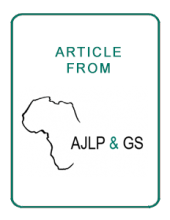Land Library
Welcome to the Land Portal Library. Explore our vast collection of open-access resources (over 74,000) including reports, journal articles, research papers, peer-reviewed publications, legal documents, videos and much more.
/ library resources
Showing items 37 through 45 of 441.This study is aimed to assess features of land governance arrangements in the Eastern Africa region. Comparative and qualitative research approach was employed to achieve the objectives of the study.
This paper underscores that corruption remains of key concern to land governance institutions in Africa, escalates costs of doing business and therefore undermines investments.
There is a gap between land tenure and the physical land giving room for impersonation, multiple allocation and sale of plots, loss of possession, land racketeering and fraud through forgery.
L’urbanisation des campagnes africaines pose le problème de l’avenir des paysages agraires situés à la périphérie des villes. Au Sénégal comme dans la plupart des villes ouest-africaines, ces espaces connaissent une recomposition spatiale liée à l’extension urbaine.
This article aims to help the governance of peri-urban land conflicts from an approach focused on the control of urban sprawl, which is the paramount characteristic of Yamoussoukro, the political Capital City of Côte d'Ivoire.
La région Tanger-Tetouan-Al Hoceima située au nord-ouest du Maroc a connu, dans des dernières décennies, différents travaux d’aménagement de territoire qui ont eu, certainement, un impact sur le paysage et l’écosystème de la région.
The adoption of modern Land Administration Systems (LAS) in Sub Saharan Africa is done with the expectation that principles of equity, non-discrimination, efficiency, transparency, productivity and sustainability among others may be achieved to meet societal needs in those countries.
Land use development and transformation in informal settlements have been taking place because informal settlements have been alternative way of providing affordable housing to low income people.
Innovative technologies for land governance can promote clear land tenure and effective land administration, reduce corruption, and support economic growth. Mobile technologies offer real-time access to information and open communication between people and government services.

